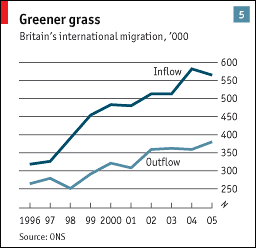| SOCIAL BRITAIN - Some ideas for
studyline cooperation between English and social science Oh brother - celebrity and class Poor whites - class a cultural barrier Communicative Style Income distribution Globalisation and welfare Thatcher legacy - from nanny state to state nannies Risk society Keynesian economic model |
Oh brother
Jan 19th 2007 Economist.com. A row over reality TV says more about
class than race - or does it?
MORE magazines documenting the ups and, better, the downs of celebrities
are sold in Britain than anywhere else, relative to the size of its
population. The reasons given for the country’s vast appetite for celebrity
vary from the historical (Brits like having a class system and have created
a new one on the embers of the old) to the sociological (people no longer
know their neighbours well enough and so gossip about famous lives instead).
The result is benign, most of the time. British celebrity culture is
tolerant: ethnic minorities and homosexuals feature prominently. And it is
democratic: no discernible talent is needed to enter the aristocracy of
celebrity.
Not this week, though, when the unpleasant, even racist, treatment of Shilpa Shetty, an Indian actress, on Celebrity Big Brother, a reality-television show, has been at the top of news bulletins. The format of the programme resembles a performance at the Circus Maximus, though with the lions given the week off. Ms Shetty herself has said that her bullying was not racist in the fully fledged sense of the word. Instead, it showed something of how British society is changing thanks to globalisation. The television programme put a wealthy, well-spoken Indian together with some white working-class Brits, who decided that she was not just different from them, but more upper class. One called her a princess, and meant it as an insult. All of which should, if the sociologists are right, inject new life into Britain’s fascination with celebrity
POOR WHITES THE FORGOTTEN UNDERCLASS
28.10.06
TONY PERRY remembers the first time he saw a black child. So exotic did the baby seem in mid-1950s Dagenham that locals flocked to see what they described, without malice, as a “piccaninny”. These days, strangers of all hues are moving to the working-class neighbourhood in east London. The white natives, who blame everything from stabbings to the difficulty of obtaining public housing on immigrants, are not pleased. Many of Mr Perry's friends talk about leaving. What is worse, the new arrivals are more qualified and have better prospects than the people among whom they have settled.
 |
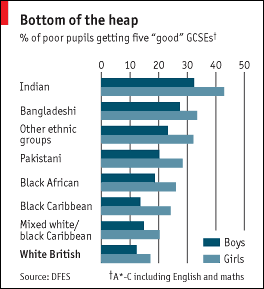 |
Apart from election campaigns, when rising support for far-right
political parties in areas such as Dagenham causes alarm, the traditional
working class is largely overlooked. When politicians say that some
communities are failing to integrate with mainstream society, they mean
Muslims from the Indian subcontinent. When campaigners complain that schools
are failing some children, they often cite black boys. Yet the nation's most
troubled group, in both absolute and relative terms, is poor, white and
British-born.
The troubles begin at school. Last year white teenagers entitled to free
school meals—the poorest tenth—did worse in crucial GCSE
examinations than equally poor members of any other ethnic or racial group (see
chart). In the borough of Barking and Dagenham, the contrast is sharper
still. Just 32% of all white children there got five “good”
GCSEs last year, compared with 39% of blacks and
52% of Asians. In Leicester, just 24% of whites got five decent
GCSEs.
Excerpt from Sweet Sixteen by Ken Loach
Opening in Greenock, a rundown town near Glasgow, "Sweet Sixteen" follows
teenager Liam (Compston) as he struggles to prepare for the release of
his ex-heroin addict mum from prison
Desperate to try and build them a proper family home, Liam
needs money. And fast. Muscling in on his mum's boyfriend's drug business,
Liam and his pal Pinball (Ruane) set themselves up as dealers (BBC Review).
Filmen er en skildring af den kulturelle fattigdoms problemer og en bitter kommentar til de nemme løsninger. Liams forsøg på at skabe sig en forretning er udtryk for, at han forsøger at leve op til Thatchertidens opskrift, at man kan starte virksomhed, hvis man er arbejdsløs. Der er en plads til alle ved samfundets bord. Der blev ikke plads til Liam, selv om han er en dygtig fyr, der forstår at udnytte den økonomiske kriminalitets krinkelkroge til at skabe sig noget, der i hvert fald en periode på det økonomiske plan ligner en succesrig tilværelse. Han forsøger selv at løse sine problemer på markedsmæssiggørelsens og kommodificeringens tilsyneladende betingelser (Jf. uddrag af filmens script herunder, hvor han og kammeraten Pinball først slæger views i stjernekikkert og senere cigaretter (fags) på en pub.)
Sweet Sixteen Script (From start, where Liam and Pinball sell views of stars: ) - Who wants a show? - Me!
25p a go. Pay Pinball.
Get in a line. First in. Get in the back, you. Move. Money.
Do you not want a shot? Get in the queue.
- Have you paid? Sure you've paid? - Aye.
- See anything? - Aye.
Time's up.
See the big one? That's Saturn.
- You see it yet? - No. Still stars.
- Still stars. - There?
- Still stars? - How about now?
Still stars.
That big one's Saturn. You can tell by its rings. Next.
Who's paid? Pinball, have they paid?
Aye. They get five seconds because they paid half.
- What do you see? - Stars.
I'll put it in your pocket.
- I'm putting 25 pence in your pocket. - Get out there. Move.
You know how long a day is up there?
- Ten hours, 14 minutes. - Aye.
- Fuck-all time up in Saturn. - There's not much time, young man. Next.
There you go, mate.
- You looking for cheap fags? - What kind are they? No.
- Make you look better than you already do. - No, thanks. Not my kind.
- Hiya, ladies. - Do you want to buy any cheap fags?
These will prevent heart disease.(.....)
(With sister Chantelle, who is fixing his wounds after mother's friend Stan beat him up, because he wouldn't help to get drugs into prison:) This'll sting. Easy, Chantelle. - You haven't asked about our mum yet. - I don't need to ask about her. If you're good for wee Calum, you can stay. - No, I'll pay my way. - Do you not listen? If you're good for wee Calum, you can stay. And I'll not be playing social workers. I won't be taken for a ride. We share the cooking and the housework. There'll be no swearing. It's bad for Calum. And no smoking. That's bad for Calum. No farting. Bad for Calum. Turn round. They won't take you back at school? - That's one way of putting it. - How about the Children's Panel? I'm not up for review till Mam gets out. Why don't you come to my call centre class? Doesn't cost nothing. They might take you on when you're . Pinball might be a priest, eh? Liam, look at the state of you. Look at yourself. You gonna get yourself sorted out? Liam? Look at me. You gonna sort yourself out? - Aye. - Promise me. (Film script) |
Filmen førte til en ophedet debat om censur i England
p.g.a. sproget.
Sproget bruges forskelligt i de sociale klasser, jvf
skemaet. Det er naturligvis en ret skematisk måde at opgøre det på, og denne
inddeling i klassesprogskoder har været udsat for en del kritik. Det
er imidlertid givet, at der er nogle forskelle. Man ser da også mange
forfattere benytte sig bevidst af disse forskelle til at sige noget om
personerne og deres sociale baggrund.
TOP
|
MIDDELKLASSE- OG OVERKLASSESPROG |
ARBEJDERKLASSESPROG |
|
Elaboreret kode |
Restringeret (begrænset) kode |
|
Kontekstubunden (det, der siges, forstås uafhængigt af den givne sammenhæng): ”bolden røg ind gennem vinduet i et hus”. |
Kontekstbunden (forståelse bundet til den givne sammenhæng): ”bolden røg derind.” |
|
Sætningsopbygning, hvor hoved- og bisætninger bruges til at danne over- og underordnelsesforhold, der angiver årsag, betingelse m.m.: ”Bolden røg ind gennem vinduet og derfor kom der en vred mand frem”. |
Flere sideordnede led (hovedsætninger). Mange betingelses- og årsagsforhold er underforstået og altså ikke formuleret i de anvendte bindeord: ”Bolden røg ind gennem vinduet, og han kom frem og var gal”. |
|
Komplekse verbalfraser (f.eks. førdatid, konjunktiv, passiv form, o.lign.), ex.: ”han ville været kommet, hvis….” |
Brug af mange personlige pronominer (jeg, os, vi, dem, etc) |
|
Abstrakte begreber, f.eks. igennem anvendelse af adjektiver, ex: ”det retfærdige politiske demokrati”. |
Simplere adjektiver og adverbier og mindre brug af denne ordklasse, ex: ”det skal ikke kun være de rige mennesker i toppen, der bestemmer.” |
|
Brug af ualmindelige adjektiver (tillægsord), ex.: ”komplekse sagsforhold i det hyperkomplekse samfund.” |
Ikke så mange abstrakte begreber. Større brug af konkrete ord, altså ex. ”bord” i stedet for ”demokrati” |
|
Brug af ualmindelige adverbier (biord) |
Sociocentriske fraser: Ex.: ”Vi danskere”. ”Vi i vor gruppe” |
Ordforklaring: Elaboreret og begrænset kode: Den engelske sociolingvist
Basil Bernsteins måde at beskrive forskelle på de to sprogkoder: Den
elaborerede kode er konstekstubunden, dvs den, der lytter, kan forstå, hvad
der siges, uden at kende til hele baggrunden. I den begrænsede kode kan det
være svært at forstå, hvad der henvises til, idet der benyttes formuleringer
som ”Og så røg bolden derind” (hvorind? Det forventes, den lyttende ved,
hvad der tales om).
Sunday December 24, 2006 The Observer Richard Holloway
In spite of centuries of confident talk about him, a halo of mystery still surrounds Jesus, whose birth we celebrate tomorrow. A great theologian of the early 20th century said of him: 'He comes to us as one unknown, without a name.' …. I think there are three powerful elements in what we know about his teaching that are enduringly important and have lessons for us today. The first was his attitude towards the laws and customs by which we have chosen to organise ourselves. He did not believe they should be afforded absolute, unchanging authority over us. They were created to assist us in leading the good life, but he knew that if they were not held lightly, and with a shrewd appreciation of their provisional nature, they could easily became stupid and tyrannous.
He wanted us to be on the alert for the moment when human welfare was served not by conforming to, but by abandoning such codes. This was the point of the parable of the Good Samaritan, who violated a central prohibition of his religion by going to the aid of a Jew who had fallen among thieves.
This is a simple insight, but it has
profoundly radical consequences for public life. For example, if it were
being applied to Britain's misguided drug laws, five young women from
Ipswich would be alive today. Forcing addicts to sell their bodies to feed
their addiction, when we could prescribe them heroin and help them manage
their lives better, is to accord higher value to an arbitrary law than to
the sacredness of human life itself. This was the kind of cruel folly of
which Jesus was witheringly critical. Historically, it is the most
vulnerable members of society who have been the traditional victims of this
kind of theoretical intransigence, and
TOP contemporary Britain affords many examples of
its continuing power over us. …..
HOOKED ON HOOKERS The Sun 20 December 2006
He 's picked up girls for months and lives in red light district
THE truck driver arrested yesterday over the Ipswich ripper murders is said to be a regular user of prostitutes. One hooker told how Steve Wright was a regular client who paid her for sex about three times a month but also used a string of other girls. And a neighbour revealed the 48-year-old sneaked vice girls into his home for sex behind partner Pamela's back - often picking them up after driving her to work.
A heroin addict named Lou, 28, said she last saw Wright three weeks ago when she charged him her usual £40 rate for full sex.She said: "I'd describe him as a regular customer, someone who has been picking up girls for the last eight months or so.
"I know he uses lots of different prostitutes but I don't know if they include any of the ones who were murdered.
"You often see him driving round in his
blue Mondeo looking for girls even if he had picked you the night before. He
didn't strike me as weird and never gave me any reason to believe I was in
danger.
Evening Star Comments section April 07
You will never be forgotten Annette. I hope they find the monster who did
this soon. My heart goes out to your family and friends R.I.P xxx
Kelly, Ipswich
Yet another beautiful woman taken by the sick person who is going this. My
deepest sympany goes out to Annette's family and friends. What a shock to
the system - 5 young pretty girls just taken for no explained reason. I'm
just hoping this is it now the killer has taken 5 lives. Let's prey he gets
caught without taking anither. Once again my heart goes to all the women's
friends families. May you 5 sweethearts rest in peace x x x x x
Donna, Ipswich
Figur 1 :
Udvikling i indkomstfordeling (gini-koefficient) for disponibel indkomst.
Formuefordeling (til højre)
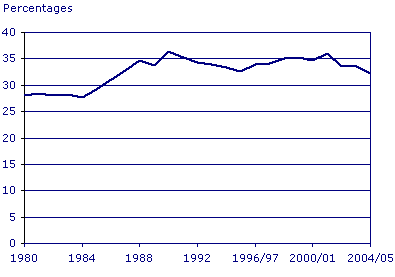 |
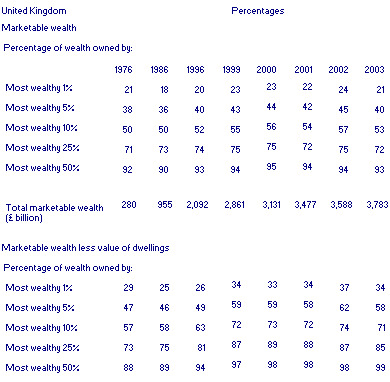 |
Figur 2 : Gini-koefficienten (Danmark): Areal mellem 45-grader
linje (fuldstændig lige indkomstfordeling) og blå linje
TOP (Lorenzkurve) divideret med hele arealet under 45 graders
linje
Kilde: Finansministeriet
POEM
|
A Map of the City |
I hold the city here, complete; And every shape defined by light Is mine, or corresponds to mine, Some flickering or some steady shine. This map is ground of my delight. Between the limits, night by night, I watch a malady's advance, I recognize my love of chance. By the recurrent lights I see Endless potentiality, The crowded, broken, and unfinished! I would not have the risk diminished. Thom Gunn |
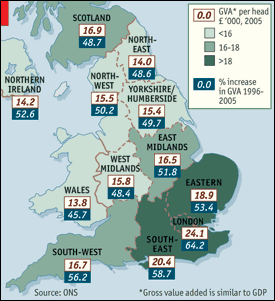 A A |
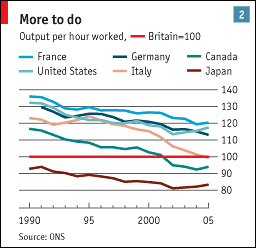 B B |
Sociale indikatorer: TOP
Working age people on benefits: Folk i arbejdsdygtig alder på bistand. Incapacity claimants: Invalide-/førtidspensionister Lone parents: Eneforældre: Denne gruppe er ret stor. Hed tidligere lone mothers. De står ikke til rådighed for arbejdsmarkedet, når børnene er under 16. Det har New Labour foreslået sat ned til 12 år. |
Brown legacy: Arv efter G. Brown. Spending: Samlede offentlige udgifter Revenues: Samlede off. indtægter. HM Treasury |
| THATCHER She wanted to replace what she called the "Nanny State" and its cradle-to-grave "coddling" with the much more bracing risks and rewards of the "enterprise culture." Thatcher was a minority within her own government and did not have control over her Cabinet... but Thatcher knew what she wanted to go after, right from the beginning. "The two great problems of the British economy," she declaimed, "are the monopoly nationalized industries and the monopoly trade unions." To conquer them, she would have to declare war. Coming to office in the wake of endless strikes, she was forced to focus on the powerful trade unions. Unless the unions could be curbed and a more level playing field instituted' nothing of substance could be accomplished. The government dug itself in, to varying degrees, on a series of strikes. It also got critical legislation through Parliament limiting the ability of unions, sometimes battling among themselves for power, to turn every disagreement into a class war. At the same time, the government also got busy trying to displace Keynesianism with monetarism. Instead of intervening with fiscal policy, the Tory government believed that its main economic job was to ensure a steady growth in the money supply that would be commensurate with economic growth. The traditional Keynesian measures of economic management—employment and output targets—were abandoned in government budgetary documents, in favor of targeting the growth in money circulation in the economy. Huge and immensely controversial cuts were made in government spending, certainly reversing the trend of almost four decades. Yet the immediate results were not economic regeneration. Inflation, already deeply entrenched, was made worse by the oil-price shock of 1979 and the programmed public-sector pay hikes. Unemployment also continued to increase. (http://www.pbs.org/wgbh/commandingheights/shared/pdf/prof_margaretthatcher.pdf ) A Thatcher legacy: Buy your council home. From Nanny State to State Nannies: |
State nannies to be sent in to target 'at risk' families, the Independent 18 March 07
The state should step in to turn around young lives at the first sign they are becoming blighted by crime, poverty, violence and drug abuse, Mr Blair will say.
If a parent is sent to jail, families could be given a period of "intensive home visits" by health visitors, suggest officials.
In making the state responsible for the delivery of "bespoke" packages for "at-risk" families, Mr Blair hopes to draw a dividing line between the Government and David Cameron's Tories.
Mr Cameron, meanwhile, will today claim his party backs the NHS "heart and soul", while promising to free the health service from ministerial control. In a speech at his party's spring conference in Nottingham he will contrast Labour's "mania for controlling and directing things from the centre" and "pessimism about human nature" with his determination to "put people back at the heart of the NHS".
The Tory leader has called for a "social responsibility" revolution in which private firms, voluntary bodies and citizens take control of the delivery of public services. Mr Blair, on the other hand, is leaving No 10 insisting that the state should step up its efforts to provide better-quality services. The Prime Minister will suggest that tens of thousands of families should receive "makeovers" designed to change every aspect of the behaviour holding them in poverty.
On Tuesday, ministers will launch a review expanding existing policies aimed at identifying potential troublemakers in the womb, with home visits for "vulnerable" mothers over a two-year period...... TOP
| A Clockwork Orange (Critique
of the Welfare State for human conditioning, paternalism and no morals) TRAMP Can you... can you spare some cutter, me brothers? Alex rams his stick into the Tramp's stomach. The boys laugh. TRAMP Oh-hhh!!! Go on, do me in you bastard cowards. I don't want to live anyway, not in a stinking world like this. ALEX Oh - and what's so stinking about it? TRAMP It's a stinking world because there's no law and order any more. It's a stinking world because it lets the young get onto the old like you done. It's no world for an old man any more. What sort of a world is it at all? Men on the moon and men spinning around the earth and there's not no attention paid to earthly law and order no more. The Tramp starts singing again. TRAMP Oh dear land, I fought for thee and brought you peace and victory. Alex and gang move in and start beating up on old Tramp. (Film Script) |
Centralt i faget står et diakront og synkront kendskab til engelsktalende områder og deres kulturelle særegenheder. Der kan være tale om viden om historie og udvikling, politisk og kulturelt i forbindelse med en forståelse af vores egen kultur og dens sammenhæng med strømninger i engelsksprogede lande. Ligesom ældre tekster naturligt indgår i det supplerende stof for at sikre en viden om den kulturelle og litteraturhistoriske baggrund, er nyere tekster et udtryk for litterære, kulturelle og erkendelsesmæssige udviklingstendenser, som er nødvendige for at erhverve en forståelse af egne grundvilkår og forståelse af egen samtid.
Litterære tekster giver en impressionistisk indgangsvinkel, mens ikke-litterære tekster ofte kan forklare nogle årsagssammenhænge. Derfor kan der ofte med fordel inddrages andre teksttyper end rent litterære i arbejdet for at kunne etablere en overordnet historisk-kulturel sammenhæng.
I arbejdet med nyere tekster vil det være relevant at inddrage moderne retninger, som kan være med til at sætte tilværelsen i perspektiv. Her tænkes på indholdsmæssige emner som for eksempel postmodernismen og globaliseringen, som den kommer til udtryk gennem den såkaldte rygsækrejselitteratur
Travelling to India twenty years after being a knapsack tourist there TOP
|
RISIKOSAMFUND Det første moderne er endvidere præget af en ”programmatisk individualisering”, dvs individualismen er institutionaliseret; og det er præget af en tro på et ”erhvervsarbejdssamfund med fuld beskæftigelse”. Herudover bygger det ”første moderne” på en instrumentelt natursyn, et videnskabeligt defineret rationalitetskoncept, og det er præget af princippet om funktionel differentiering. Den ”anden modernitet” er præget af fem forandringsprocesser:
Den videnskabelige verden har rettet
kritik mod Beck. Der har især været kritik af teorien om
”risikosamfundet”. Den filosofiske kosmopolitisme er normative teorier om, hvordan verden politisk burde se ud. Når det gælder det sidste, sætter Beck sin lid til EU
|
 Source: UK Statistics Office Short Cuts dialogue: Spraying against the medflies...: .....Sandy, shut the windows
Alcohol related deaths |
Union membership in Britain TOP
Virtual economy model Keynesian demand management
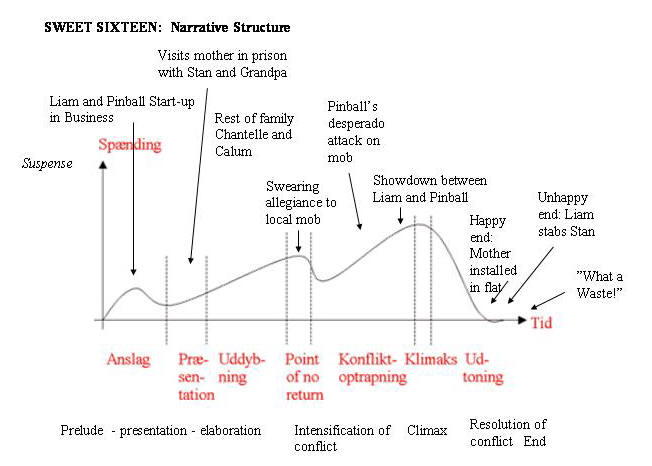
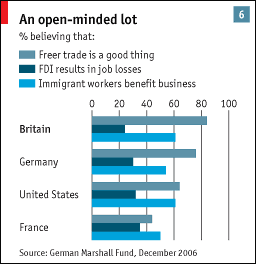 C
C